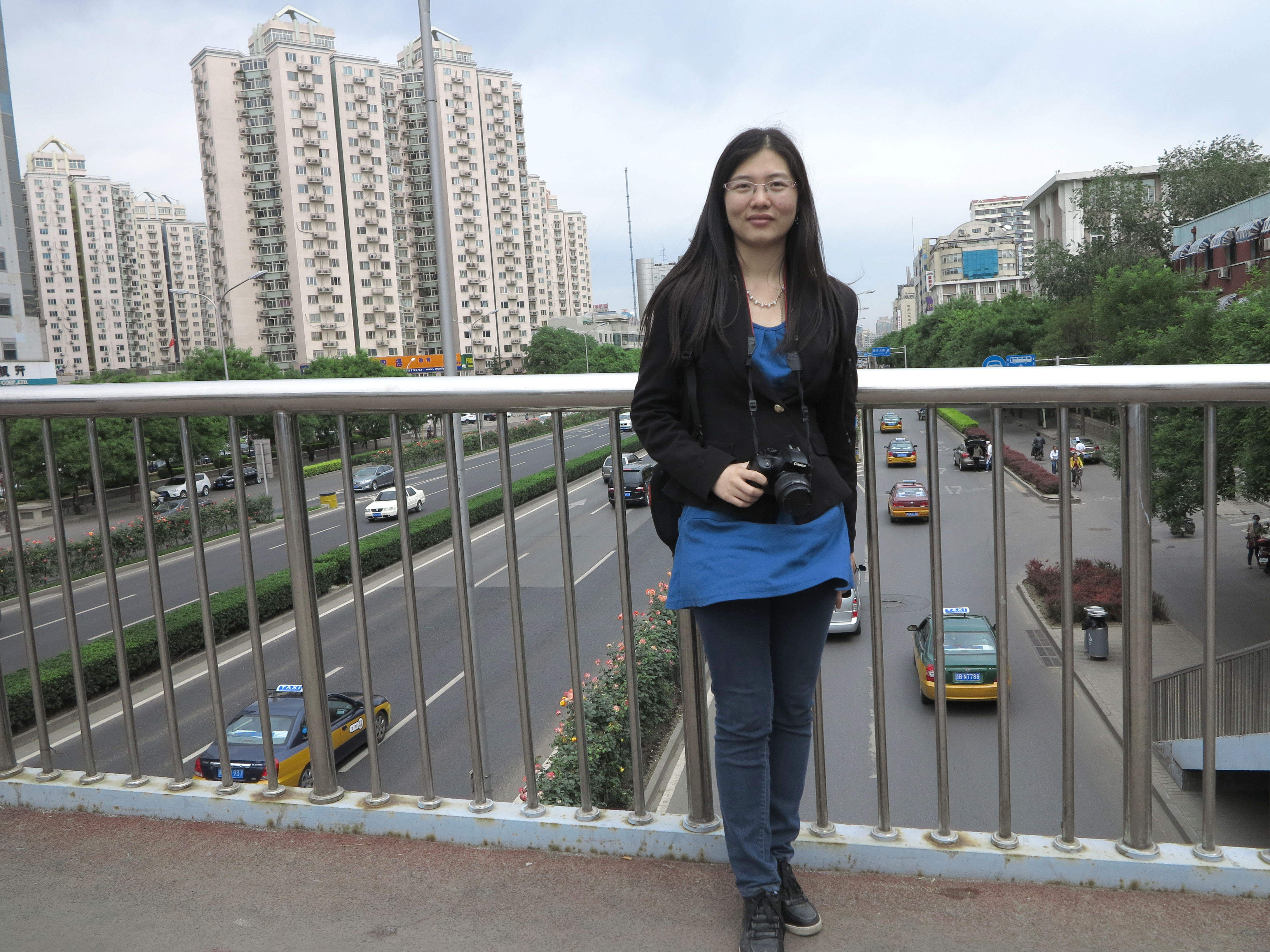
Jock Lauterer, Senior Lecturer and Director of the Carolina Community Media Project at the School of Journalism and Mass Communication at the University of North Carolina at Chapel Hill, has returned to China for a third summer to teach Community Journalism at workshops from Beijing to Chongqing to Guangzhou. His field guide and text book, “Community Journalism: Relentlessly Local,” has been revised and translated into Chinese and will be published next week in China. He is blogging about the experience and the burgeoning growth of community newspapers on his “Blue Highways Journal.”
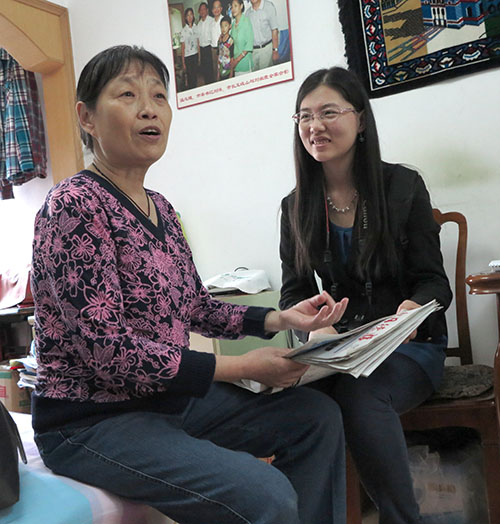
In search of the elusive community in China…I am led to Desheng Street in old Beijing, and home to an experimental community newspaper, Desheng Today, a 20k-circulation, eight-page tabloid weekly produced by three women reporters working for the local government.
Ah, you say — a government rag!
Yes, maybe, but in China, even small steps can be giant ones. A local government wanting local coverage is the rare exception, and an enlightened local political leader seeking to communicate directly with — and to hear back from the governed — is downright visionary, so my host, Professor Chen Kai, tells me.
She explains further: Beijing (affectionately known as BJ) is broken down into districts and then into 128 bite-sized municipal units called “streets” (which is totally confusing to Westerners, since in China such a “street” means something more like “neighborhood,” but a humongous one by our standards — including about 150,000 souls or about 30,000 households).
Desheng Street is such a place, located in a shade-lined older quieter section of this sprawling megalopolis, far from the newer high-rise towers seen leaping into the smog-choked air beyond the Sixth Ring Road.
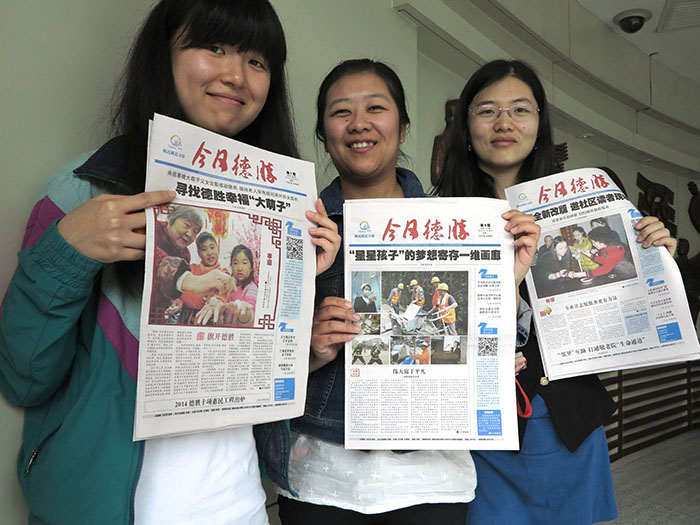
In a smoky-smelling government building where smoking is forbidden, Desheng Today’s 12 X 12 office is home to three young women reporters. But they don’t spend much time there, 26-year-old reporter Xia Linan (Summer) tells us.
“We get out and walk around to find out the stories and talk to the residents,” explains the reporter, camera around her neck.
This boots-on-the-ground approach appears to be working. Launched four years ago, Desheng Today is beloved by its readers – especially by the seniors of Desheng, for whom Today has become a staple of community life, and its reporters like family.
Sixty-five-year old retiree Mrs. Liu Shu Xia has saved every single edition of Today, from Vol. 1 No. 1, back in 2010.
“I cannot live without the newspaper!” she tells us excitedly, sitting on the edge of her bed in her Spartan but spotless apartment that smells sweetly of incense.
“They report on the average person’s life,” she says, “It’s so close to our lives.”
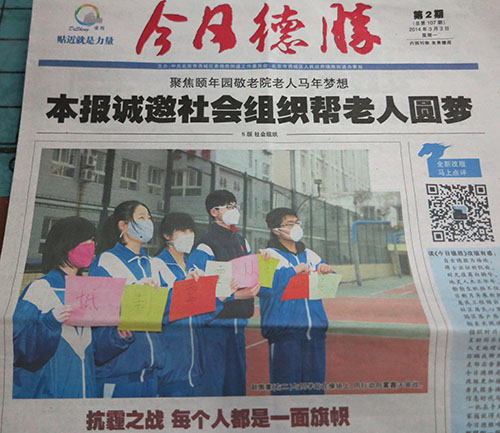
Indeed. Summer, in her two years on “the street,” has forged many such one-on-one relationships with “her residents” — so much so that when residents see news happening, or even if they think a simple feature story should be in the paper — they call Summer, go down to the newspaper office, or have a cup of tea with the reporter to discuss the idea.
I am impressed. Mrs. Liu can’t stop talking about “her paper.”
When the new edition of Today arrives in her mailbox each Monday, she says she “can’t wait to read it,” and often just stands right there reading…and often the neighbors come out join her, talking about what’s in the paper this week.
Before the paper started, she tells us,” We didn’t know what the street-level government was doing.” Now, if there’s a change in the leadership, if a new flea market is started, of if there’s a neighborhood volunteer clean-up day scheduled, it’s in the paper, she says.
Mrs. Liu herself has been the subject of several features, and she says such attention makes her feel happy and good about herself and the neighborhood — and by extension, good about her local government.
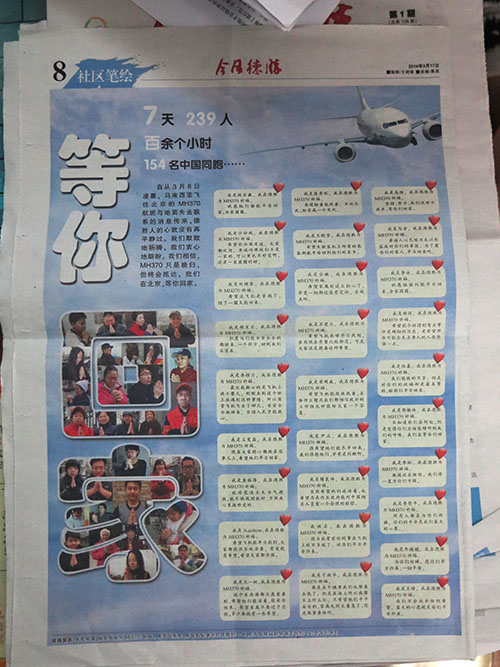
Pointing to a front-page photograph of a group of schoolchildren carrying signs and wearing protective breathing masks, she explains: when her grandson took his holiday gift money to buy 1,000 masks to donate to his classmates and teachers to protest the air pollution, Mrs. Liu thought the event worthy of the paper, and phoned Summer, who she calls “her reporter.”
Before the Desheng Today, such a story and photo would never have made the major metro paper, much less the front page, Prof. Chen tells me.
But it’s not just the hyper-local stories that Today covers. Reporters also want to know what readers are thinking about the big national and international stories. So after the Malaysian Flight 370 disaster, reporters hit “the street” to find out local reactions. And although no one they spoke with actually had lost anyone in the flight or knew anyone who did, the reporters said they encountered an outpouring of compassionate and prayerful responses — published the next week on a full-page spread.
Additionally, Mrs. Liu says she appreciates how Today’s reporters take interest in community activities she cares about: her dance troupe, her church events, the calligraphy club meeting.
“What the big papers report is so far away from our life,” she concludes.
**** *** *** ***
Mrs. Liu isn’t the only fan of Today with I get to hear from on this visit.
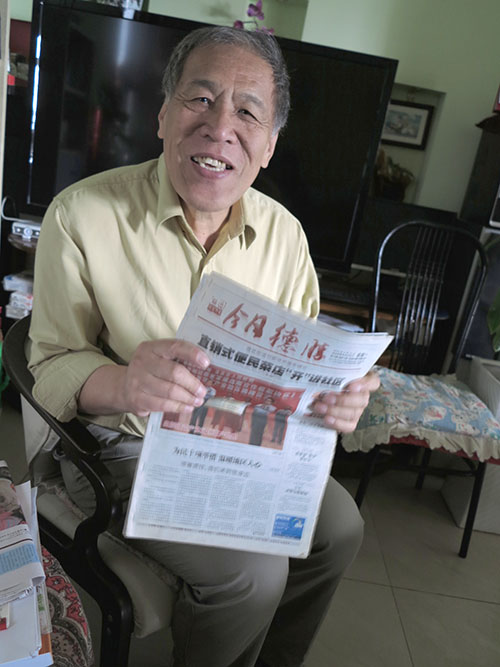
Sixty-six year old artist Mr. Qi considers Today reporter Summer “like my own daughter.”
A big, stoop-shouldered man with an expressive, long Boris Karloff face and deep resonating baritone voice, the retired government worker tells us proudly, “I know all about the lives of those journalists,” (meaning that they are three single young women). “The whole neighborhood is trying to find nice boys for them!” he says with a grin.
Summer blushes with pleasure as Mr. Qi looks on affectionately. He too has been subject of her stories — with his regulation-sized pool table dominating the little apartment, converted today into his artists studio on top of the green felt.
When Mr. Qi and his calligraphy club recently began making dumplings for the shut-in elderly, Summer found out and did a story. The word quickly spread, and the next thing, the poetry club wanted to join in — and then the community chorus, and then the whole dumpling affair simply mushroomed.
Sounds like community-building to me.
*** *** *** ***
I realized some time ago that we couldn’t just “cut and paste” American community journalism onto the Chinese media landscape — that whatever model of community journalism that China chooses to create, it must be and will be wholly Chinese-style.
Well, maybe this is one model. Even though such a government/media cross-pollination strikes your average U.S. journalist as heresy, here in China, Prof Chen tells me, this could be one way forward. We have to take our small victories where we can find them.
Why hasn’t this been tried elsewhere I wonder? Maybe other cities don’t know about it, the professor replies. Besides, she adds, it takes a special kind of leader to invite such media attention.
When asked if Desheng Street Today readers could ever complain in the paper about local government, or had there ever been a controversy between the paper and the local government, Prof Chen sighs and says thoughtfully, “That’s a question that is too big…” and taking a deep breath, she adds, ending the subject with a piercing look : “I’ve always told you, democracy is a luxury.”
On the way home, the pollution lifts, and for the first time, we can see the western mountains in the distance, shimmering like a vision.

